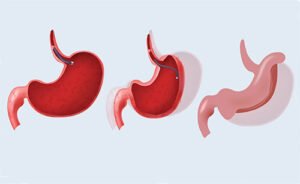Obesity – Endoscopic Management Without Surgery
Obesity has emerged as one of the biggest public health challenges today. Excessive weight has been linked to various health problems such as diabetes mellitus, hypertension, increased lipid level, tumors in different parts of the body, obstructive sleep apnea, and pain in the joints.
Classification of Obesity
Body Mass Index or BMI is a simple measure that is used to diagnose and classify obesity. It is calculated by dividing the weight of a person in kilograms by the square of his height in meters (kg/m2). According to the WHO, a BMI of 25 or more is identified as overweight while a BMI of 30 or more is considered Obesity. Criteria for overweight and obesity are lower for the Asian population.
Causes of Obesity
The basic cause of obesity is the imbalance between calories consumed and spent by a person. Our dietary habits have changed in recent times, energy-dense foods, which have a high content of sugar and fat, have replaced balanced and healthy diets. At the same time, physical activities have been reduced, which has limited energy expenditure. The imbalance between calorie intake and expenditure has led to the extra deposition of fat, leading to obesity.
Various diseases such as low secretion of hormones by the thyroid gland, Cushing disease, and genetic disorders can also lead to obesity.
Complications related to Obesity
Obesity leads to insulin resistance and increased level of inflammatory cytokines in the body. Due to insulin resistance, obese patients are more prone to develop diabetes mellitus, and many of these patients may require insulin to control blood sugar levels. Hypertension and excessive lipid level are also more common in obese patients. Due to excessive weight, many patients also complain of pain in knee joints and are prone to develop osteoarthritis, and may require knee transplantation. Obstructive sleep apnea, a condition in which sleep is disturbed due to difficulty breathing may also occur in obese patients. Various tumors and cancers also occur more frequently in obese individuals. These complications can be prevented and treated with weight loss, and it has been observed that, by losing 10% of total body weight, many of these complications can be avoided.
Treatments for Obesity
Lifestyle modification is the first line of treatment. Limiting calorie intake and increasing physical activity are advised for the initial management of obesity. Patients unable to lose weight may benefit from endoscopic procedures. Conventionally surgery has been the standard procedure for obesity management but has poor acceptance by the patient. In recent times, various endoscopic procedures have emerged and shown good efficacy for weight loss.
Endoscopic sleeve gastroplasty (ESG):
- ESG is an endoscopic technique that is performed without any skin incision. During ESG, multiple sutures are applied in the gastric wall, which leads to a reduction in the size of the stomach. Reduced gastric capacity, limits food intake, and leads to weight loss. Expected weight loss is 20% of total body weight. The Patient needs to be admitted for 48 hours for the procedure.

Intragastric balloon placement:
- In this method, during the endoscopy, a balloon filled with 500-750 ml of water is placed in the stomach. This leads to a reduction in food intake due to early satiety. The balloon is kept in the stomach for a duration of 6 months to one year. Expected weight loss with the balloon is 10-15% of total body weight. Significant improvement in blood pressure, blood sugar, and lipid levels, and improvement in symptoms of OSA are observed after the weight loss. Obesity is a preventable and curable disorder if the proper lifestyle and treatment are followed.



